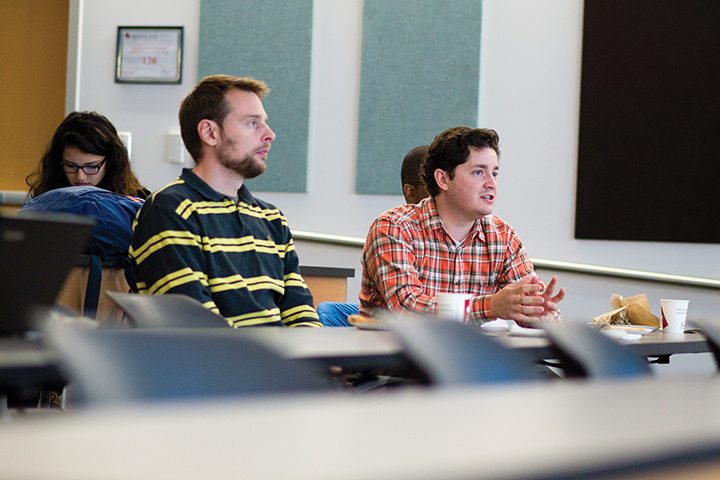Graduate Student Government members at the University of Maryland say they will continue to push for collective bargaining rights for student workers after a corresponding bill failed to move out of committee last week.
The bill, which Maryland state Del. Marc Korman (D-Montgomery) introduced in February, called for student workers in the University System of Maryland to have the right to collectively bargain for better working rights, such as negotiating wages and working conditions. Korman’s bill would have repealed language in Maryland’s current law that keeps student workers and faculty within the system from being able to collectively bargain.
In this state’s General Assembly, bills have to receive favorable votes in the full House of Delegates or Senate by the end of the day on March 20 to be sent to the opposite side of the legislature. And a committee has to vote in favor of a bill before it is sent to the House or Senate floor for a vote. Korman’s bill failed to make it out of the House Appropriations Committee in time to be voted on in the House.
“It wasn’t necessarily unexpected,” said Caden Fabbi, Graduate Student Government chief of staff. “We’re planning to continue pursuing this bill — we kind of expected that this would be a two-year process. It’s a matter of getting past roadblocks.”
Fabbi noted that while the bill received a lot of support from members of the legislature and student groups, new bills often take more than one General Assembly session to be voted out of committee for a floor vote. GSG’s next steps will include building up “our grassroots support” and “reaching out to other schools in the University of Maryland system through the USM Student Council,” he said. The council includes two students from each degree-granting institution within the system and provides advice to the chancellor and the system’s Board of Regents.
Collaborative discussion of collective bargaining rights with student groups at other system universities — the University of Maryland, Baltimore, especially — did not start until the middle of last semester, Fabbi said, which reduced how much support the bill could get from student groups. He added that he plans to reach out to other system schools and work with them this semester and throughout the summer to encourage more support for a collective bargaining bill in the 2018 General Assembly session.
An organization that has already cropped up amid this university’s push for collective bargaining is the Fearless Student Employees Coalition, which formed last semester and is made up of GSG, Student Government Association, Student Labor Action Project, United Academics of Maryland and Graduate Assistant Advisory Committee members. The coalition has held town halls to hear concerns from student employees, and GSG last semester also adopted a resolution supporting this legislation in the General Assembly.
“I can’t see any graduate student government opposing this [bill],” Fabbi said.
The State Higher Education Labor Relations Board enforces the labor relations laws — including collective bargaining — in this state’s colleges and universities. Student employees can currently ask for better pay and working conditions through a meet-and-confer process, which was established in 2012 after another collective bargaining bill fell through. This process is less structured than full collective bargaining agreements and does not guarantee a change in rights or a favorable outcome, said Katie Brown, GSG’s vice president of public relations.
[Read More: UMD grad students can’t bargain salaries. This town hall looked for a solution.]
Fabbi and Brown said a hurdle in gaining collective bargaining rights is the Maryland Senate itself, which they feel is opposed to granting collective bargaining to student workers. There was not much feedback from the Senate in regard to the 2012 proposal about why the legislature might oppose granting collective bargaining rights, Fabbi said.
Korman testified on March 2 in front of the House Appropriations Committee about the bill’s importance, stating that collective bargaining “is not only about the pay of workers” but also extends to other terms of employment, such as hours. This university currently pays its student workers the state minimum wage, which is $8.75, despite Prince George’s County minimum wage of $10.75. The gap is something the coalition hopes to change through collective bargaining.
At a February GSG meeting, GSG president Stephanie Cork said the difference in pay between this university and the county made no sense, noting that the minimum wage should match the county’s so that graduate students can afford to live locally.
Two graduate students at this university — Will Howell, a Graduate Assistant Advisory Committee board member, and Abishek Gopal, a graduate student in mechanical engineering — also testified in support of the bill this month and presented the committee with more than 30 written testimonies from student employees at this university.
“We need collective bargaining rights to remain competitive with our peer schools,” Howell testified on March 2. “The majority of schools that are in the Big Ten have collective bargaining rights for graduate students at least.”
Penn State’s graduate students, via the Coalition of Graduate Employees at PSU, just voted and filled out paperwork to create collective bargaining, and the National Labor Relations Board ruled in August that graduate student workers at private schools can collectively bargain.
If student workers at all state universities in Maryland had the right to collectively bargain and chose to do so, the State Higher Education Labor Relations Board would see its expenses increase by about $43,700, according to a state fiscal analysis of the bill.



